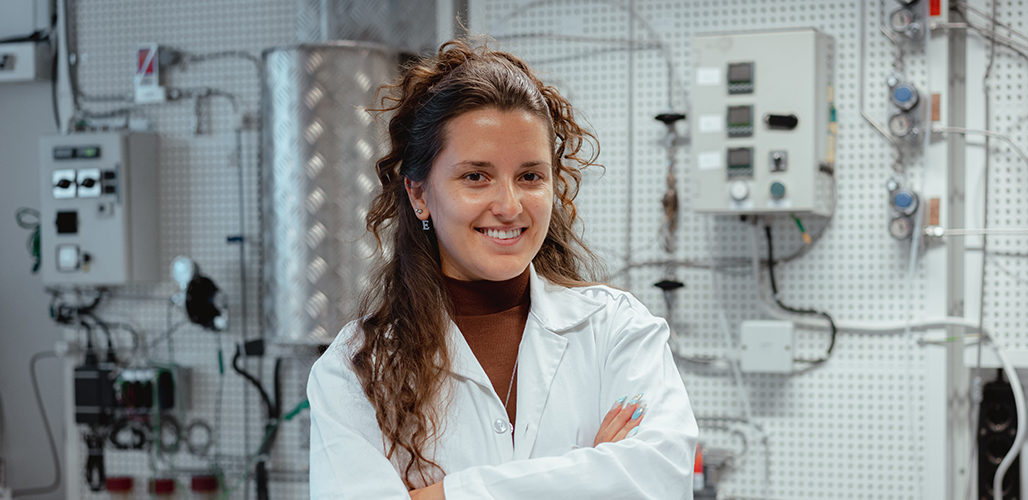“Your Friendly Nuclear Physicist” demystifies nuclear science

What does it take to be an effective science communicator and why is it vital for researchers to participate in public outreach? Elina Charatsidou, a Ph.D. candidate at the Department of Physics, believes that clear and transparent communication is essential to bridge the gap between research findings and public perception of a specific subject. Through her educational and entertaining YouTube channel ‘Your Friendly Nuclear Physicist’ she aims to demystify nuclear science, dispel misconceptions, and promote informed discussions on nuclear energy.
Can you tell us a bit about yourself and your academic journey in physics and nuclear engineering?
I was born in Ukraine and raised in Greece, where I studied physics and obtained a Bachelor's degree. My path then led me to Sweden and KTH for a Master’s degree in Nuclear Energy Engineering. Currently, I am working towards my PhD, focusing on innovative nuclear fuel development.
What motivated you to start a scientific YouTube channel?
Two things mainly. First, every social gathering reminded me of how tricky it was to explain my work to my friends and family and to separate nuclear energy from nuclear accidents. This was particularly difficult as my family lived in Ukraine, 500 km from Chernobyl when the accident happened. Secondly, I realized that there's a huge gap between nuclear research and what most people know or understand. I wanted to create a platform to bridge this gap.
You started your channel a year ago and as we speak you have almost 72,000 followers and your videos have been viewed more than 5 million times. What is the secret of your success?

Relatability, I think. In the vast ocean of information, what makes a channel stand out is its ability to communicate without being overwhelming. I always aim to break down complicated nuclear concepts into digestible, engaging content. It's about striking the right balance between being understandable and not diluting the core science. Furthermore, I believe that authenticity is very important. Viewers recognize genuine passion and commitment, and I think they value transparency and dedication.
Who are you trying to reach with your channel?
Honestly? Everyone. I aim to make the channel accessible to people of all ages and backgrounds. We need to engage young individuals, and our future decision-makers, but also create content that is equally enlightening for older generations who may have pre-existing beliefs about nuclear energy. Through the channel, I strive to provide clarity and foster a well-informed understanding of the subject.
Why do you believe it's crucial for scientists to communicate well?
Clear communication from scientists is an absolute game-changer, especially in fields such as nuclear energy, where public perception can strongly influence policy. However, distilling complex scientific concepts into easily digestible information isn't something we're traditionally taught during our academic journeys. Reaching out to those outside our field means challenging ourselves, moving out of our comfort zones, and condensing years of education into comprehensible, impactful messages. As we strive for scientific excellence, we must also recognize the responsibility to communicate our findings to the public in a transparent and understandable way. In a sense, it's not only about being a good scientist, it’s also about being an effective educator and communicator. It shouldn't be optional, it's imperative.
Has working in science communication shifted your academic goals?
Absolutely. Engaging with the public emphasized how vital awareness is, especially in nuclear energy. I'm now keen to combine this outreach with my research.
You're juggling a YouTube channel and a PhD! How's that working out?
It's a tightrope walk! My weekdays are focused on my research, and weekends? That's YouTube time. It helps immensely to have a fantastic content creator by my side, making the whole process smoother.
Have you teamed up with others to boost your content?
I'm looking at some collaborations, especially with labs and professionals in the nuclear sector. I believe it'll give viewers a genuine peek into the world of nuclear operations and help with transparency and breaking taboos about the nuclear industry.
Any memorable feedback from your audience?
A recent interview with two high school students from Jönköping was special. After our in-depth discussion about nuclear energy and its impact on society, they expressed that although they had been ambivalent about nuclear power at first, after the interview they were genuinely curious about its benefits and understood the importance of nuclear education and public awareness. Moments like that? Priceless.
What's on the horizon for your channel?
I'm keen to take my audience on a global journey, highlighting innovations from different corners of the world to stimulate informed debate and broaden the understanding of the nuclear industry. The vision remains the same: to create a science-based public discourse that will drive change in education and energy policy-making.
Reported by: Marta Marko-Tisch
